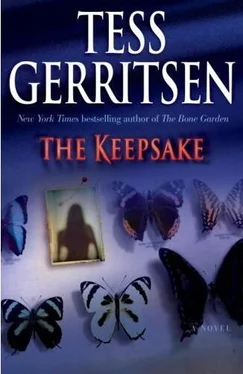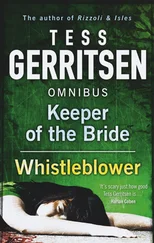Frail as she was, supported by a cane, Cynthia stood her ground and kept her gaze on the two detectives. “Do you know where my Bradley is?” she asked.
“No, ma’am,” said Jane. “We were hoping you could tell us.”
“I’m going to walk you back to your room,” said Kimball, and he took his wife’s arm.
Angrily she shook him off, her attention still fixed on Jane. “Why are you looking for him?”
“Cynthia, this has nothing to do with you,” said Kimball.
“It has everything to do with me,” she shot back. “You should have told me they were here. Why do you keep hiding things from me, Kimball? I have a right to know about my own boy!” The outburst seemed to leave her out of breath, and she tottered toward the nearest chair and sank down. There she sat so motionless, she might have been just another artifact in that dark room of funerary objects.
“They came to ask about that girl again,” said Kimball. “The one who disappeared in New Mexico. That’s all.”
“But that was such a long time ago,” murmured Cynthia.
“Her body has just been found,” said Jane. “In Boston. We need to speak to your son about it, but we don’t know where he is.”
Cynthia slumped deeper into the chair. “I don’t know, either,” she whispered.
“Doesn’t he write you?”
“Sometimes. A letter here and there, sent from strange places. An e-mail once in a while, just to say he’s thinking of me. And that he loves me. But he stays away.”
“Why is that, Mrs. Rose?”
The woman raised her head and looked at Kimball. “Maybe you should ask my husband.”
“Bradley’s never been all that close to us,” he said.
“He was until you sent him away.”
“That has nothing to do with-”
“He didn’t want to go. You forced him.”
“Forced him to go where?” asked Jane.
“It’s not relevant,” said Kimball.
“I blame myself, for not standing up to you,” said Cynthia.
“Where did you send him?” asked Jane.
“Tell her,” said Cynthia. “Tell her how you drove him away.”
Kimball released a deep sigh. “When he was sixteen, we sent him to a boarding school in Maine. He didn’t want to go, but it was for his own good.”
“A school?” Cynthia gave a bitter laugh. “It was a mental institution!”
Jane looked at Kimball. “Is that what it was, Mr. Rose?”
“No! The place was recommended to us. Best of its kind in the country, and let me tell you, the price tag reflected it. I only did what I thought was best for him. What any good parent would do. They called it a therapeutic residential community. A place where boys could go to deal with…issues.”
“We never should have done it,” said Cynthia. “ Younever should have done it.”
“We had no choice. He had to go.”
“He would have been better off here, with me. Not sent to some boot camp in the middle of the woods.”
Kimball snorted. “A camp? More like a country club.” He turned to Jane. “It had its own lake. Hiking and cross-country ski trails. Hell, if I ever go off my rocker, I’d love to be sent to a place like that.”
“Is that what happened to Bradley, Mr. Rose?” asked Frost.
“He went off his rocker?”
“Don’t make him sound like a lunatic,” said Cynthia. “He wasn’t.”
“Then why did he end up there, Mrs. Rose?”
“Because we thought-Kimball thought-”
“We thought they could teach him better self-control,” her husband finished for her. “That’s all. Lotta boys need tough love. He stayed there for two years and came out a well-behaved, hard-workin’ young man. I was proud to take him to Egypt with me.”
“He resented you, Kimball,” said his wife. “He told me that.”
“Well, parents have to make hard choices. That was my choice, to shake him up a little, set him on the right track.”
“And now he stays away. I’m the one who’s being punished, all because of that fine choice you made.” Cynthia lowered her head and began to cry. No one spoke. The only noises were the crackling fire and Cynthia’s quiet sobbing, a sound of raw and unremitting pain.
The ring of Jane’s cell phone was a cruel interruption. At once, she silenced it and moved away from the hearth to answer the call.
It was Detective Crowe on the line. “Got a surprise for you,” he said, his cheerful voice a jarring contrast to the grief that hung over that room.
“What is it?” she asked softly.
“FBI has her fingerprints in their system.”
“Josephine’s?”
“Or whatever her real name is. We lifted the prints from her apartment and ran them through the AFIS database.”
“We got a hit?”
“Now we know why our girl ran. Turns out her prints match some latents that were lifted off a crime scene twelve years ago, in San Diego.”
“What was the crime?”
“Homicide.”
“The victim was a thirty-six-year-old white male named Jimmy Otto,” said Detective Crowe. “His body was discovered in San Diego, after a dog dug up a tasty little snack: a human finger. The dog’s owner saw what Fido brought home, freaked out, and called 911. Dog led the police back to the body, which was buried in a shallow grave in a neighbor’s backyard. The victim had been dead for a few days, and wildlife had gotten at the extremities so they couldn’t get any usable fingerprints. There was no wallet on the body, either, but whoever stripped his ID missed a hotel key card that was tucked in his jeans pocket. It was for a local Holiday Inn, where the guest was registered under the name James Otto.”
“A hotel key card?” said Jane. “So this victim didn’t live in San Diego.”
“No. His address was here, in Massachusetts, where he lived with his sister. Carrie Otto flew out to San Diego and ID’d her brother’s clothing. And what was left of him.”
Jane tore open a packet of Advil, popped two tablets in her mouth, and washed them down with lukewarm coffee. Last night, she and Frost had not arrived home in Boston until twoAM, and what little sleep she did get was repeatedly interrupted by one-year-old Regina, who demanded hugs and reassurance that Mommy really was home again. This morning, Jane had awakened with a monster headache. The twists and turns of the investigation were making that headache worse, and the glow of the fluorescent lights in the conference room made even her eyeballs hurt.
“You both with me so far?” said Crowe, glancing up at Jane and Frost, who looked as exhausted as Jane felt.
“Yeah,” she muttered. “So what did the autopsy show?”
“Cause of death was a single gunshot wound to the back of the head. The weapon was never recovered.”
“And whose backyard was he buried in?”
“It was a rental house,” said Crowe. “The tenants were a single mother and her fourteen-year-old daughter, and they’d already packed up and vanished. The police sprayed the house with luminol, and the girl’s bedroom lit up like Vegas. Traces of blood were all over the floor and the baseboards. That’s where Jimmy Otto was killed. In the girl’s bedroom.”
“And this was twelve years ago?”
“Josephine would have been about fourteen,” said Frost.
Crowe nodded. “Except her name wasn’t Josephine back then. It was Susan Cook.” He gave a laugh. “And guess what? The real Susan Cook died as an infant. In Syracuse, New York.”
“It was another co-opted ID?” said Jane.
“Ditto on the mother, who also had a fake name: Lydia Newhouse. According to the San Diego PD report, mother and daughter rented the house for three years, but they kept to themselves. At the time of the killing, the girl had just finished the eighth grade at William Howard Taft Middle School. Very bright, according to her teachers, work way above her grade level.”
Читать дальше












